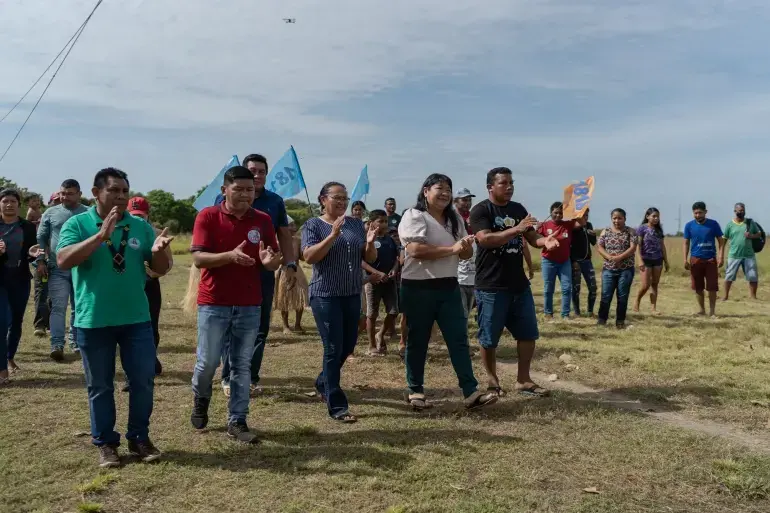
A democracia brasileira enfrenta seu maior teste
To read in English, continue scrolling.
"Tenho três alternativas para o meu futuro: estar preso, ser morto ou a vitória", disse o presidente Jair Bolsonaro há um ano quando questionado sobre as eleições deste ano, em 2 de outubro. Mais uma vez , Bolsonaro prometia não deixar o cargo pacificamente e, na mesma ocasião, ameaçou com um golpe militar se perdesse seu mandato.
Assim como nas últimas eleições americanas, o Brasil está passando por um momento de incerteza diante dos ataques de Bolsonaro ao sistema eleitoral e uma nova campanha marcada pelas fake news. As eleições brasileiras despertam interesse mundial, já que Bolsonaro, o ex-presidente americano Donald Trump e o primeiro-ministro húngaro Viktor Orbán são considerados as figuras mais proeminentes da nova extrema direita populista. Equipes de reportagem em todo país e de diversas partes do mundo, muitas com o apoio do Pulitzer Center, estão esta semana mostrando os desafios de um novo governo no Brasil.
Após quatro anos de administração Bolsonaro, as reportagens revelam que as políticas para proteger os povos indígenas e promover o desenvolvimento sustentável neste país megadiverso estão em ruínas.
"Desde o momento em que Bolsonaro abre a boca para falar sobre as questões absurdas, ilegais e ilícitas que ele apoia, ele coloca em risco a vida dos povos indígenas", disse Joenia Wapichana, a primeira deputada federal indígena no Brasil, aos grantees Sam Cowie e Emily Costa e à colaborador convidado Avener Prado. Trata-se de uma entrevista exclusiva à mídia estrangeira, publicada na Al Jazeera e apoiada pelo Rainforest Journalism Fund do Pulitzer Center.
Sua preocupação também surge na mídia nacional. Os repórteres Vinicius Sassine e Lalo de Almeida relataram para a Folha de S.Paulo como o processo de demarcação de terras indígenas no Brasil, que reconhece a ocupação de território e proporciona proteção governamental, parou completamente sob a administração de Bolsonaro. A decisão trouxe invasões, tráfico de drogas e conflitos para terras indígenas intencionalmente abandonadas.
Os problemas vão além das políticas ambientais e da região amazônica. A fome aflige mais de 30 milhões de brasileiros; a falta de moradia é visível nas grandes cidades; a igualdade de gênero tem enfrentado grandes retrocessos, como mostra a grantee Angela Boldrini em um novo podcast produzido pela Folha de S.Paulo e a agenda pró-armas de Bolsonaro está dilacerando a vida das mulheres, como relatado por nossa Miel Fellow, Laís Martins.
Embora a economia brasileira esteja melhorando - com a inflação de volta a níveis menores que 10%, o desemprego abaixo de 9%, e o crescimento do PIB esperado em 2,5%, o alívio ocorre às custas de uma montanha de estímulos e subsídios turbinados pela campanha de reeleição de Bolsonaro, o que provavelmente comprometerá o crescimento futuro.
Uma coisa é certa: O Brasil está polarizado. As pesquisas favorecem o ex-presidente Luiz Inácio "Lula" da Silva contra Bolsonaro. Se nenhum dos dois receber uma votação majoritária, eles disputarão um segundo turno no final de outubro. O que está em jogo? O reputação das instituições democráticas brasileiras e a pergunta se elas prevalecerão.
Saudações!
Brazil’s Democracy Faces Its Greatest Test
“I see only three options: prison, death, or victory,” said Brazilian President Jair Bolsonaro a year ago when questioned about this year’s elections on October 2. More than once, Bolsonaro has promised to not go down without a fight and has even threatened a military coup if he loses his mandate.
Just as in the last U.S. elections, Brazil is going through a moment of uncertainty in the face of Bolsonaro's attacks on the electoral system and a revamped campaign marked by fake news and disinformation. The Brazilian elections spark global interest, as Bolsonaro, former U.S. President Donald Trump, and Hungarian Prime Minister Viktor Orbán are considered the most prominent figures of the new populist far right. Reporting teams around the world and locally, many with the support of the Pulitzer Center, are this week showing the challenges of a new government in Brazil.
After four years of Bolsonaro's administration, the stories reveal that policies to protect Indigenous peoples and promote sustainable development in this megadiverse country are in ruins.
“From the moment he opens his mouth to talk about the absurd, illegal, illicit issues that he supports, he puts the lives of the Indigenous people at risk,” Joenia Wapichana, the first Indigenous federal deputy in Brazil, told grantees Sam Cowie and Emily Costa and guest contributor Avener Prado in a rare interview with foreign media published in Al Jazeera and supported by the Pulitzer Center’s Rainforest Journalism Fund.
The discourse echoes in national media. Grantees Vinicius Sassine and Lalo de Almeida reported for Folha de S.Paulo on how the process of demarcating Indigenous land in Brazil, which recognizes occupation of territory and provides government protection, has halted completely under Bolsonaro’s administration. The decision brought invasions, drug trafficking, and conflict to intentionally abandoned Indigenous lands.
Problems go beyond environmental policies and the Amazon region. Hunger afflicts over 30 million Brazilians; homelessness is visible in major cities; and gender equality has faced major setbacks, as told by grantee Angela Boldrini in a podcast produced by Folha de S.Paulo. In addition, Bolsonaro’s pro-gun agenda is tearing women’s lives apart, as reported by our Miel Fellow, Laís Martins.
Even though Brazil’s economy is improving—with inflation back below 10 percent, unemployment below 9 percent, and GDP now expected to grow 2.5 percent—it’s at the expense of Bolsonaro’s flood of stimulus and subsidies, which will likely compromise future growth.
One thing is certain: Brazil is polarized. Polls favor former President Luiz Inácio "Lula" da Silva against Bolsonaro. If neither receives a majority vote, they will dispute a second round at the end of October. What’s at stake? The trail of Brazilian democratic institutions and the question if they will prevail.
All best,


Impact
Security for Sale, a project supported by a Pulitzer Center Machine Learning grant, inspired similar investigations into corporate homebuyers in Kentucky and New Jersey. Following the project’s publication in The Charlotte Observer and The News and Observer, reporters from Kentucky and New Jersey reached out to grantees Payton Guion, Gordon Rago, and Tyler Dukes for guidance on their own investigations.
On August 24, 2022, the Kentucky Center for Investigative Reporting published a report on racial inequities and displacement in west Louisville. The Asbury Park Press, the third-largest newspaper in New Jersey, released its own report and searchable database the same day.
The Security for Sale project complements data-based reporting with on-the-ground stories on how neighborhoods and residents are affected by corporate landlords, including a report on efforts to raise awareness and unionize tenants.
This message first appeared in the September 30, 2022, edition of the Pulitzer Center's weekly newsletter. Subscribe today.
Click here to read the full newsletter.















